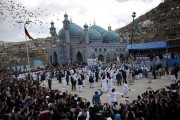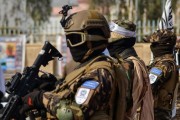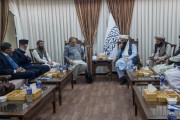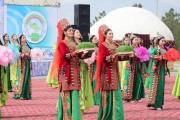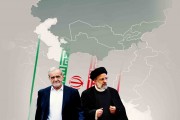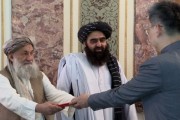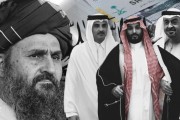Publish Date
Saturday 24 June 2023 - 08:18
recommended
0
Taliban Government: The Need for Transition from Military Rule to Good Governance
According to the systemic theory in political studies, the institution of power is a dynamic and living system, and if it cannot adapt itself to the surrounding environment, its survival and durability will be seriously threatened. The countries of the region are trying to make the Taliban government understand that Afghanistan's presence and participation in the "regional order", "regional economic network", and "macro-regional plans" requires that this government distance itself from the nature of a military group in the political dimension, and change its role to a government with a responsible nature. The regional countries expect the Taliban government to take a specialized approach in current issues, so that all matters are not overshadowed by the political approach. Iran's proposal to investigate the situation of water rights of the Helmand (Hirmand) River by a joint technical team, is an attempt to prevent this issue from entering the political phase. But it seems that the Taliban government, like the former government of Afghanistan, is also politicizing this specialized and non-political issue without any reason, under the influence of public emotions.
By: Abdul Rahim Kamel
Theoretical approach
The extent of the Taliban's power and control has encompassed the entire geographical territory of Afghanistan, and the Taliban has now become an absolute and irreplaceable authority in Afghanistan land. The opportunity that has now been provided for the Taliban brings with it certain requirements and obligations.
There are documented reasons that after the Soviet military withdrawal from Afghanistan, "Mujahideen groups", "Taliban" and "liberal groups", each in turn, got good opportunities to form a government in Afghanistan. However, each of these governments was very "hurried", and none of them succeeded in establishing a stable government in Afghanistan. Just as gaining power has its own specific requirements, maintaining and utilizing that power in the form of a stable government also requires special expertise and requirements.
Systemic theory in political studies considers institution of power as a dynamic and living system, and believes that if the institution of power cannot adapt itself to its surrounding environment, its survival and durability will be seriously disputed and threatened in all respects.
With this approach, therefore, the Taliban must overcome the characteristics of a military and ethnic group, and become a national and comprehensive government. The main characteristic of a militant and partisan group is that by creating great challenges, it questions the responsibility of the ruling government in front of public opinion. But the main characteristic of a government is that it deals with issues with tact and expertise, and acts responsibly in domestic and foreign policy.
In today's political literature, this type of governance is interpreted as "Good Governance". According to good governance indicators, the basic pillar of governance in today's world is to try to adapt to the surrounding environment and use environmental opportunities for survival.
Now that nearly two years have passed since the Taliban's military victory and absolute rule over Afghanistan, it is necessary for the Taliban government to distance itself from military victorious sentiments and political emotions, and adopt a realistic, specialized and pragmatic approach in interacting with domestic, regional and global capacities. In this article, we examine at least four indicators that are necessary to transform the Taliban government into a good governance: specialization, Pragmatism, Legalism, and Interactionism.
specialization
The responsibilities of governments in the modern world have become so specialized and complicated that without the necessary expertise and specialized approach to internal and external issues, governments cannot perform their duties appropriately nor can they demand and enforce their rights properly. Although Afghanistan has remained a traditional country, but in the last twenty years, some modern infrastructures have been created in the administrative and service areas of the country. So, without a specialized approach, the Taliban is not able to circulate this cycle in accordance with the requirements of the time.
In addition, Afghanistan's neighboring countries, and the countries of the region and the world, expect that the indicators and regulations of the modern world to be used in their interactions with the Taliban government. With this approach, these countries do not want to deviate from the necessary regulations and requirements of the modern world, towards the traditional and cumbersome world with Taliban interpretations. On the contrary, these countries expect that the Taliban government distance itself from political emotions, and instead of taking an absolute political perception of issues, try to adopt a specialized and realistic approach to issues.
In recent months, this expectation of the countries of the region and the world from the Taliban government has become more apparent. The countries of the region are trying to make the Taliban government understand that Afghanistan's presence and participation in the "regional order", "regional economic network" and "macro-regional plans" requires that this government distance itself from the nature of a military group in the political dimension, and change its role to a government with a responsible nature.
In addition, the countries of the region are trying to make the Taliban government to take a specialized approach in current issues, so that all matters are not overshadowed by the political approach. For example, Iran proposed to investigate the situation of water rights from the Helmand River by a joint technical team from Iran and Afghanistan, with the aim of preventing the normal and historical issues between the two neighboring countries from entering the political phase for no reason. But it seems that the Taliban government, like the previous government of Afghanistan, does not have a specialized view on this issue and sometimes, under the influence of public emotions and without any reason, it politicizes a specialized and non-political issue. This shows that sooner or later, the Taliban government is bound to accept and implement specialization as a basic and mandatory pillar in its governance.
Pragmatism
Nearly two years have passed since the rule of the Taliban government in Afghanistan. Evidence shows that both the Afghanistan people and the international community and the countries of the region, now expect the Taliban to take practical steps in order to achieve good governance, and provide a practical and reassuring answer to their legitimate demands.
From this point of view, if the Taliban cannot or does not want to provide a practical answer to the demands of the Afghanistan people, the world and the countries of the region, probably no country will enter into a reliable and long-term engagement with the Taliban government. In this case, the tactical and short-term engagement of countries with the Taliban government cannot solve the basic problems of Afghanistan in any way. Evidence shows that the countries of the region are now demanding the Taliban government to go beyond the announced policies, and adopt a completely realistic and pragmatic policy in response to their concerns.
The Chinese government has recently asked the Taliban government to give a written commitment to the China to control and restrain the members of the East Turkestan Islamic Movement (ETIM). It is despite the fact that the Taliban government has always declared that militant and separatist groups based in Afghanistan cannot use Afghanistan's soil against countries of the region. It seems that this declared policy of the Taliban government can no longer assure the countries of the region, and these countries are looking for the practical measures of the Taliban government to restrain or expel the regional terrorist groups from Afghanistan territory. This expectation of regional countries in engagement with the Taliban government indicates that the ambiguous foreign policy of the Taliban is no longer applicable to regional issues, and it is required that the Taliban government adjust and implement its foreign policy in a realistic and pragmatic manner.
Legalism
The data of Management Science clearly show that the classical administrative rules are ineffective in today's world, and today's governance cannot be managed only by verbal instructions and regulations. The modern governance shows that as long as the warnings and oral statements of the rulers do not turn into law, there is no obligation or guarantee of implementation. On the other hand, all the values, criteria and indicators of a government can be understood and observed in the form of codified and established laws, and a lawless government always looks ambiguous, incomprehensible and unpredictable. This situation puts both the citizens of a country and the countries of the region and the world in a state of doubt in engagement with such governments and blocks the way of any interaction and cooperation, because in the absence of law, a situation arises where there is no ground for mutual understanding and reasoning.
The necessities of governance require that the Taliban government take practical and specialized efforts to formulate the constitution and by-laws, and codify its mutual rights and duties with the people of Afghanistan and the world in a legal manner - so that its implementation can be guaranteed, and also make the situation understandable.
Interactionism
No government can carry out all country affairs alone and by itself. The classical interpretation of governance and government functions is unjustified in today's world. The developments of today's industrialized world have greatly expanded the range of activities and needs, in such a way that governments alone cannot handle it. That is why the logic of supporting private and civil sector participation has been raised.
Studies show that among the indicators of good governance, "participation index" is the most important and vital one. The participation index guarantees the joint interaction of all internal parts of a country, and facilitates the use of all political, economic, social and cultural capacities of the country by the government.
Without providing national participation in Afghanistan, the Taliban government cannot benefit from all internal capacities and supports in the political, economic, security and development dimensions.
It is necessary for the Taliban government to adopt an interactive approach in both domestic and foreign policy. As much as the Taliban government needs interaction with all potential forces and capacities inside Afghanistan for the stability of its government, it also needs interaction with regional countries, especially its neighbors, to solve regional issues and challenges. From this point of view, the Taliban government needs the engagement and security cooperation of all countries in the region and Afghanistan's neighbors to fight against terrorist groups, especially the Islamic State of Khorasan Province (ISKP). Otherwise, the Taliban government cannot fight these terrorist macro plans alone.
conclusion
It can be inferred from the evidence that the Taliban government has obtained very favorable opportunities to form a stable and responsible government in Afghanistan, which has been unprecedented in the country in the last forty years. In addition, for the first time in the contemporary history of Afghanistan, all the countries of the region have found common interests and visions to form a stable and responsible government in Afghanistan.
This context requires that the Taliban government, after almost two years of absolute rule in Afghanistan, distance itself from the feelings and emotions of military victory, and take a specialized, legal and pragmatic strategy, using the painful but instructive past experiences - both in the domestic and foreign policy dimensions, especially in interaction with the countries of the region.
Abdul Rahim Kamel, is an analyst of Afghanistan issues.
Theoretical approach
The extent of the Taliban's power and control has encompassed the entire geographical territory of Afghanistan, and the Taliban has now become an absolute and irreplaceable authority in Afghanistan land. The opportunity that has now been provided for the Taliban brings with it certain requirements and obligations.
There are documented reasons that after the Soviet military withdrawal from Afghanistan, "Mujahideen groups", "Taliban" and "liberal groups", each in turn, got good opportunities to form a government in Afghanistan. However, each of these governments was very "hurried", and none of them succeeded in establishing a stable government in Afghanistan. Just as gaining power has its own specific requirements, maintaining and utilizing that power in the form of a stable government also requires special expertise and requirements.
Systemic theory in political studies considers institution of power as a dynamic and living system, and believes that if the institution of power cannot adapt itself to its surrounding environment, its survival and durability will be seriously disputed and threatened in all respects.
With this approach, therefore, the Taliban must overcome the characteristics of a military and ethnic group, and become a national and comprehensive government. The main characteristic of a militant and partisan group is that by creating great challenges, it questions the responsibility of the ruling government in front of public opinion. But the main characteristic of a government is that it deals with issues with tact and expertise, and acts responsibly in domestic and foreign policy.
In today's political literature, this type of governance is interpreted as "Good Governance". According to good governance indicators, the basic pillar of governance in today's world is to try to adapt to the surrounding environment and use environmental opportunities for survival.
Now that nearly two years have passed since the Taliban's military victory and absolute rule over Afghanistan, it is necessary for the Taliban government to distance itself from military victorious sentiments and political emotions, and adopt a realistic, specialized and pragmatic approach in interacting with domestic, regional and global capacities. In this article, we examine at least four indicators that are necessary to transform the Taliban government into a good governance: specialization, Pragmatism, Legalism, and Interactionism.
specialization
The responsibilities of governments in the modern world have become so specialized and complicated that without the necessary expertise and specialized approach to internal and external issues, governments cannot perform their duties appropriately nor can they demand and enforce their rights properly. Although Afghanistan has remained a traditional country, but in the last twenty years, some modern infrastructures have been created in the administrative and service areas of the country. So, without a specialized approach, the Taliban is not able to circulate this cycle in accordance with the requirements of the time.
In addition, Afghanistan's neighboring countries, and the countries of the region and the world, expect that the indicators and regulations of the modern world to be used in their interactions with the Taliban government. With this approach, these countries do not want to deviate from the necessary regulations and requirements of the modern world, towards the traditional and cumbersome world with Taliban interpretations. On the contrary, these countries expect that the Taliban government distance itself from political emotions, and instead of taking an absolute political perception of issues, try to adopt a specialized and realistic approach to issues.
In recent months, this expectation of the countries of the region and the world from the Taliban government has become more apparent. The countries of the region are trying to make the Taliban government understand that Afghanistan's presence and participation in the "regional order", "regional economic network" and "macro-regional plans" requires that this government distance itself from the nature of a military group in the political dimension, and change its role to a government with a responsible nature.
In addition, the countries of the region are trying to make the Taliban government to take a specialized approach in current issues, so that all matters are not overshadowed by the political approach. For example, Iran proposed to investigate the situation of water rights from the Helmand River by a joint technical team from Iran and Afghanistan, with the aim of preventing the normal and historical issues between the two neighboring countries from entering the political phase for no reason. But it seems that the Taliban government, like the previous government of Afghanistan, does not have a specialized view on this issue and sometimes, under the influence of public emotions and without any reason, it politicizes a specialized and non-political issue. This shows that sooner or later, the Taliban government is bound to accept and implement specialization as a basic and mandatory pillar in its governance.
Pragmatism
Nearly two years have passed since the rule of the Taliban government in Afghanistan. Evidence shows that both the Afghanistan people and the international community and the countries of the region, now expect the Taliban to take practical steps in order to achieve good governance, and provide a practical and reassuring answer to their legitimate demands.
From this point of view, if the Taliban cannot or does not want to provide a practical answer to the demands of the Afghanistan people, the world and the countries of the region, probably no country will enter into a reliable and long-term engagement with the Taliban government. In this case, the tactical and short-term engagement of countries with the Taliban government cannot solve the basic problems of Afghanistan in any way. Evidence shows that the countries of the region are now demanding the Taliban government to go beyond the announced policies, and adopt a completely realistic and pragmatic policy in response to their concerns.
The Chinese government has recently asked the Taliban government to give a written commitment to the China to control and restrain the members of the East Turkestan Islamic Movement (ETIM). It is despite the fact that the Taliban government has always declared that militant and separatist groups based in Afghanistan cannot use Afghanistan's soil against countries of the region. It seems that this declared policy of the Taliban government can no longer assure the countries of the region, and these countries are looking for the practical measures of the Taliban government to restrain or expel the regional terrorist groups from Afghanistan territory. This expectation of regional countries in engagement with the Taliban government indicates that the ambiguous foreign policy of the Taliban is no longer applicable to regional issues, and it is required that the Taliban government adjust and implement its foreign policy in a realistic and pragmatic manner.
Legalism
The data of Management Science clearly show that the classical administrative rules are ineffective in today's world, and today's governance cannot be managed only by verbal instructions and regulations. The modern governance shows that as long as the warnings and oral statements of the rulers do not turn into law, there is no obligation or guarantee of implementation. On the other hand, all the values, criteria and indicators of a government can be understood and observed in the form of codified and established laws, and a lawless government always looks ambiguous, incomprehensible and unpredictable. This situation puts both the citizens of a country and the countries of the region and the world in a state of doubt in engagement with such governments and blocks the way of any interaction and cooperation, because in the absence of law, a situation arises where there is no ground for mutual understanding and reasoning.
The necessities of governance require that the Taliban government take practical and specialized efforts to formulate the constitution and by-laws, and codify its mutual rights and duties with the people of Afghanistan and the world in a legal manner - so that its implementation can be guaranteed, and also make the situation understandable.
Interactionism
No government can carry out all country affairs alone and by itself. The classical interpretation of governance and government functions is unjustified in today's world. The developments of today's industrialized world have greatly expanded the range of activities and needs, in such a way that governments alone cannot handle it. That is why the logic of supporting private and civil sector participation has been raised.
Studies show that among the indicators of good governance, "participation index" is the most important and vital one. The participation index guarantees the joint interaction of all internal parts of a country, and facilitates the use of all political, economic, social and cultural capacities of the country by the government.
Without providing national participation in Afghanistan, the Taliban government cannot benefit from all internal capacities and supports in the political, economic, security and development dimensions.
It is necessary for the Taliban government to adopt an interactive approach in both domestic and foreign policy. As much as the Taliban government needs interaction with all potential forces and capacities inside Afghanistan for the stability of its government, it also needs interaction with regional countries, especially its neighbors, to solve regional issues and challenges. From this point of view, the Taliban government needs the engagement and security cooperation of all countries in the region and Afghanistan's neighbors to fight against terrorist groups, especially the Islamic State of Khorasan Province (ISKP). Otherwise, the Taliban government cannot fight these terrorist macro plans alone.
conclusion
It can be inferred from the evidence that the Taliban government has obtained very favorable opportunities to form a stable and responsible government in Afghanistan, which has been unprecedented in the country in the last forty years. In addition, for the first time in the contemporary history of Afghanistan, all the countries of the region have found common interests and visions to form a stable and responsible government in Afghanistan.
This context requires that the Taliban government, after almost two years of absolute rule in Afghanistan, distance itself from the feelings and emotions of military victory, and take a specialized, legal and pragmatic strategy, using the painful but instructive past experiences - both in the domestic and foreign policy dimensions, especially in interaction with the countries of the region.
Abdul Rahim Kamel, is an analyst of Afghanistan issues.
News code:3492





